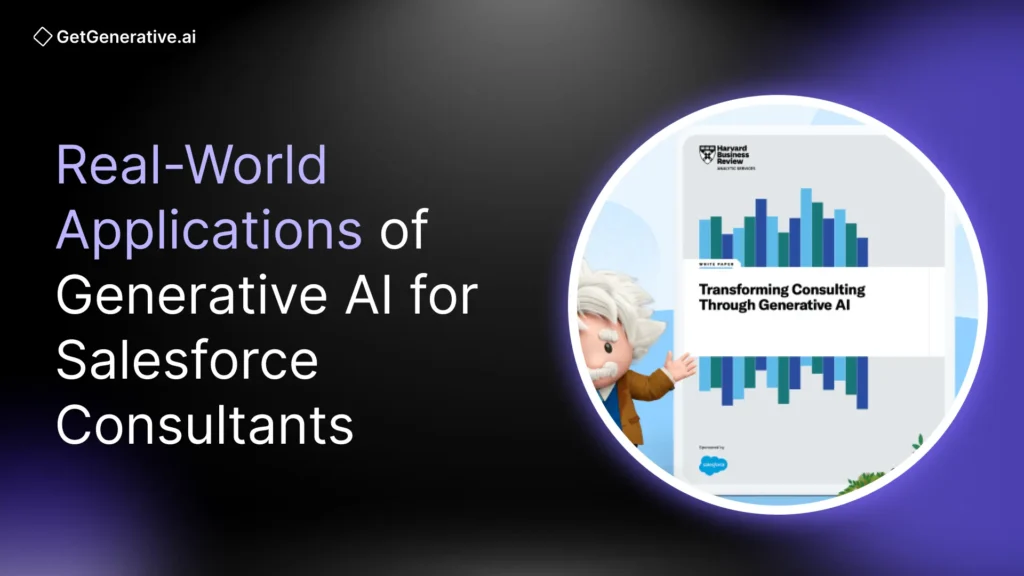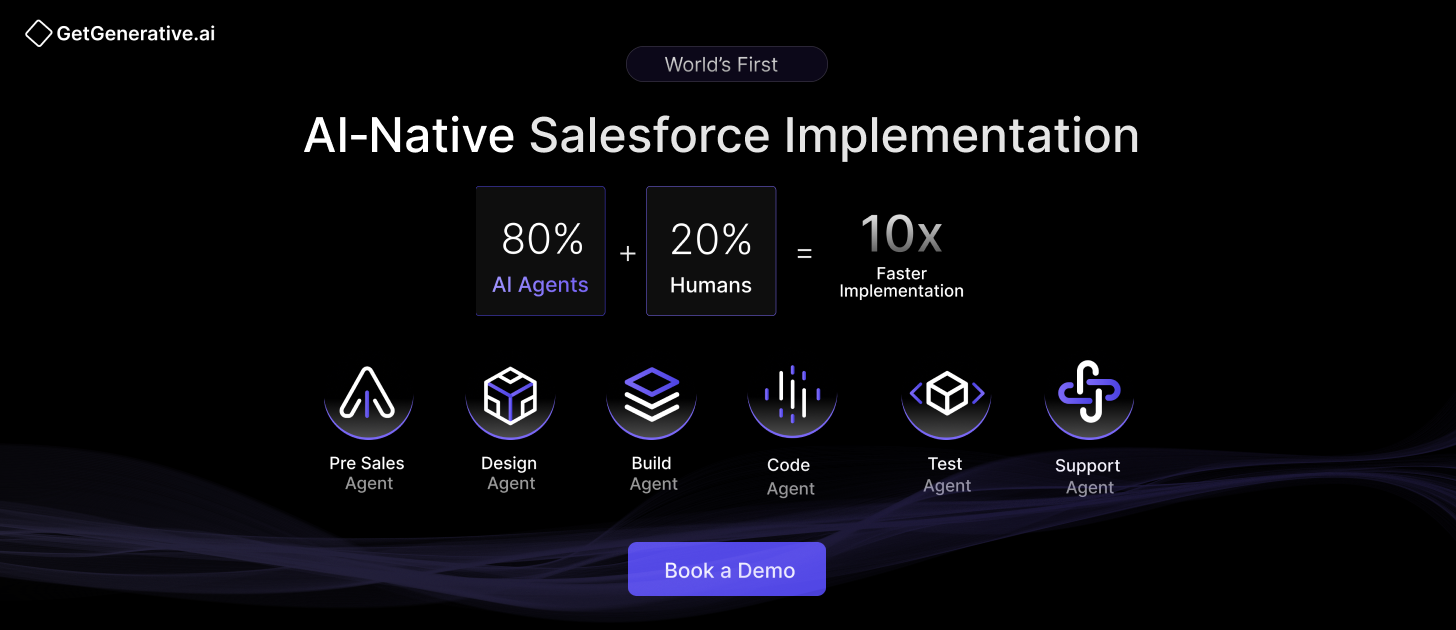Real-World Applications of Generative AI for Salesforce Consultants
As a Salesforce consultant, you’re always looking for ways to improve efficiency, enhance decision-making, and provide more value to your clients. In today’s rapidly evolving technological landscape, generative AI has emerged as a powerful tool that can revolutionize how you approach your work.
According to Gartner’s recent report, the global AI market is expected to reach $297.9 billion by 2027. As a Salesforce consultant, you can’t afford to ignore the transformative potential of this rapidly advancing technology. In this blog post, we’ll explore seven practical applications of generative AI that can revolutionize how you approach your work and deliver exceptional value to your clients.
Intelligent Opportunity Insights
Generative AI models can analyze vast troves of Salesforce data to uncover valuable insights that may have been previously overlooked. By training these models on your clients’ historical opportunity data, win-loss records, and other relevant information, you can leverage AI to identify patterns, predict potential outcomes, and surface hidden opportunities.
For example, a generative AI system could analyze a client’s past sales cycles, customer behavior, and market trends to generate personalized insights on the most promising leads, the optimal sales strategies for each opportunity, and the factors most likely to influence the deal’s success. With these data-driven insights, Salesforce consultants can provide their clients a competitive edge, guiding them toward more informed decision-making and higher win rates.
Predictive Case Management
Handling customer support cases can be time-consuming and complex, especially when dealing with a high volume of inquiries. Generative AI can streamline the case management process by automating various aspects, such as case categorization, priority assignment, and even initial response generation.
Training a generative AI model on your clients’ historical case data enables the system to predict the likely nature of a new case, assign the appropriate priority level, and even draft an initial response template. This saves time for your client’s support team and ensures a more consistent and efficient customer experience.
Moreover, the AI-powered case management system can identify patterns and trends, allowing you to proactively address recurring issues, optimize case-handling workflows, and identify areas for process improvement.
Also Read – Generative AI Glossary: A Complete Guide to Key Terms and Concepts
AI-Assisted Data Entry and Updates
Maintaining accurate and up-to-date data in Salesforce is crucial for effective decision-making and reporting. However, manual data entry and updates can be time-consuming and prone to human error. Generative AI can be a valuable ally in this regard, automating various data-related tasks and enhancing the overall data quality.
For instance, a generative AI model can be trained to extract and populate Salesforce fields from unstructured data sources, such as emails, contracts, or customer communications. This can significantly reduce the administrative burden on your client’s sales and customer service teams, allowing them to focus on more strategic activities.
Furthermore, the AI system can detect and flag potential data inconsistencies or anomalies, prompting users to review and correct the information. This proactive approach helps maintain the integrity of the Salesforce data, ensuring that your clients’ decision-making is based on accurate and reliable information.
Personalized Marketing and Communication
Effective marketing and communication are essential for building strong customer relationships and driving business growth. Generative AI can play a crucial role in this by enabling the creation of personalized, relevant, and engaging content at scale.
A generative AI model can tailor marketing messages, email content, and social media posts to each recipient by analyzing customer data, purchase history, and communication preferences. This level of personalization can significantly improve engagement, conversion rates, and customer satisfaction.
Moreover, the AI system can generate dynamic, contextual content that adapts to the recipient’s needs and preferences, ensuring every interaction feels tailored and meaningful. This level of personalization can be particularly valuable for Salesforce consultants working with clients in industries such as e-commerce, financial services, or healthcare, where customer-centricity is a key driver of success.
Enhanced Decision-Making and Forecasting
Salesforce consultants are often tasked with helping their clients make informed, data-driven decisions. Generative AI can be a powerful tool, providing advanced analytics and forecasting capabilities beyond traditional business intelligence.
By training AI models on your clients’ historical data, market trends, and other relevant information, you can enable the system to generate accurate sales forecasts, identify potential risks and opportunities, and provide scenario-based projections. This can be particularly useful for budget planning, resource allocation, and strategic decision-making.
Moreover, the AI-powered decision-support system can identify patterns, correlations, and anomalies that may not be immediately apparent to human analysts. This can help Salesforce consultants uncover hidden insights, challenge assumptions, and guide clients toward more informed and data-driven decisions.
Automating Customer Interactions
Customer service and support are critical components of any successful Salesforce implementation, and generative AI can significantly streamline these interactions.
AI-powered chatbots and virtual assistants can be trained to handle a wide range of customer inquiries, from simple product information requests to complex troubleshooting tasks. These AI-driven virtual agents can provide fast, accurate, and personalized responses, freeing your clients’ customer service teams to focus on more complex or high-value interactions.
Additionally, generative AI can be used to automate the generation of personalized customer communications, such as welcome messages, order confirmations, and follow-up emails. By leveraging the AI system’s ability to understand the customer’s context and tailor the content accordingly, Salesforce consultants can help clients deliver a more seamless and engaging customer experience.
Also Read – Becoming a Salesforce Consultant – The Ultimate Guide
Data Augmentation and Synthetic Data Generation
One of the key challenges faced by Salesforce consultants is the availability and quality of data used to train machine learning models and AI systems. Generative AI can be a game-changer in this regard, enabling the creation of synthetic data that can supplement or even replace scarce or sensitive real-world data.
By training a generative AI model on your clients’ existing Salesforce data, you can create realistic yet synthetic datasets that preserve the original information’s statistical properties and relationships. This synthetic data can train machine learning models, test new AI-powered applications, and even simulate scenarios without accessing confidential or proprietary customer data.
Data augmentation and synthetic data generation can be particularly valuable for Salesforce consultants working with clients in highly regulated industries, such as healthcare or finance, where data privacy and security are paramount. By leveraging generative AI, you can help your clients unlock the full potential of their Salesforce data while ensuring compliance with relevant regulations and data protection requirements.
Conclusion
As Salesforce consultants, we have a unique opportunity to leverage the power of generative AI to drive innovation, enhance efficiency, and deliver exceptional value to our clients. By exploring these seven practical applications of AI – from intelligent opportunity insights to data augmentation and synthetic data generation – we can unlock new possibilities, optimize Salesforce implementations, and stay ahead of the curve in an ever-evolving technological landscape.
At GetGenerative.ai, we’ve reimagined Salesforce implementation—built from the ground up with AI at the core. This isn’t legacy delivery with AI added on. It’s a faster, smarter, AI-native approach powered by our proprietary platform.
👉 Explore our Salesforce AI consulting services
Frequently Asked Questions (FAQs)
1. What is generative AI, and how can it benefit Salesforce consultants?
Generative AI refers to a class of AI models that can create new, original content based on patterns in existing data. For Salesforce consultants, generative AI can unlock many benefits, from automating data entry and enhancing customer interactions to generating personalized insights and synthetic data.
2. How can Salesforce consultants get started with implementing generative AI solutions?
The first step is assessing your client’s specific needs and pain points and then identifying areas where generative AI can have the most significant impact. Once you’ve identified the use cases, you can explore various generative AI tools and platforms or partner with AI specialists to build custom solutions tailored to your client’s requirements.
3. What are the key considerations when implementing generative AI in a Salesforce environment?
Some key considerations include data privacy and security, model bias and ethical AI, integration with existing Salesforce workflows, and change management to help your clients and their teams adapt to the new AI-powered solutions.
4. How do I measure the success of generative AI initiatives in Salesforce?
The success metrics will vary depending on the specific use case. Still, common KPIs include improved efficiency (e.g., faster case resolution), enhanced decision-making (e.g., higher sales win rates), better customer experience (e.g., increased satisfaction scores), and increased revenue or cost savings.




